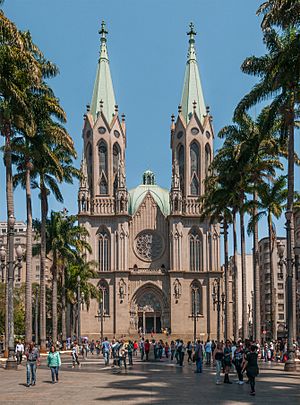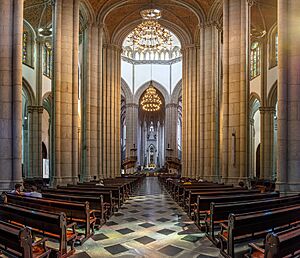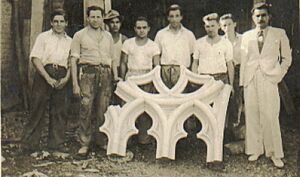São Paulo Cathedral facts for kids
Quick facts for kids São Paulo See Metropolitan CathedralCatedral Metropolitana de São Paulo |
|
|---|---|
 |
|
| Religion | |
| Affiliation | Roman Catholic |
| Province | Archdiocese of São Paulo |
| Year consecrated | 1954 |
| Status | Active |
| Location | |
| Location | São Paulo, Brazil |
| Architecture | |
| Architect(s) | Maximilian Emil Hehl |
| Architectural style | Neo-Gothic |
| Groundbreaking | 1913 |
| Completed | 1967 |
| Specifications | |
| Length | 111 metres (364 ft) |
| Width (nave) | 46 metres (151 ft) |
| Dome height (outer) | 30 metres (98 ft) |
| Spire height | 92 metres (302 ft) |
The Metropolitan Cathedral of Our Lady Assumption and Saint Paul is a very important church in São Paulo, Brazil. People also call it the See Cathedral. It is the main church for the Roman Catholic Archdiocese of São Paulo.
The current leader of the cathedral is Archbishop Dom Odilo Pedro Cardinal Scherer. He was chosen in 2007. The cathedral was built in a Neo-Gothic style. Its construction started in 1913 and finished about 40 years later. It was ready for its opening in 1954. This was just in time for São Paulo's 400th birthday. The city was founded by Chief Tibiriçá and Jesuit priests. Even with its Renaissance-style dome, some people think it's the fourth largest Neo-Gothic cathedral in the world.
Contents
History of the Cathedral
The story of the São Paulo Cathedral began a long time ago in 1589. People decided to build a main church in the small village of São Paulo. This first church was finished around 1616. It stood exactly where the cathedral is today.
In 1745, São Paulo became a diocese, which is an area led by a bishop. The old church was taken down. A new church, built in the Baroque style, took its place. This second church was finished around 1764. It served as the São Paulo Cathedral until 1911, when it was also demolished.
Building the Current Cathedral
The cathedral you see today was started by Duarte Leopoldo e Silva. He was the first archbishop of São Paulo. Building began in 1913 on the same spot where the old churches stood. A German architect named Maximilian Emil Hehl designed it. He planned a Neo-Gothic building.
The work was slow. The new Cathedral finally opened in 1954. Its tall towers were not yet finished, but it was ready for São Paulo's 400th celebration. The towers were completed later, in 1967.
After many years, the cathedral needed a lot of repair. It went through a full renovation between 2000 and 2002. Workers fixed the building and added many decorative spires. They even found the original building plans from 1912. This helped them restore the cathedral exactly as it was meant to be.
About the Building
The São Paulo Cathedral is the biggest Catholic church in the city. It is 111 meters long and 46 meters wide. Its two tall towers reach up 92 meters. The entire area of the cathedral is 5,300 square meters. The inside floor area is 6,700 square meters.
The church is shaped like a Latin cross. It has a main area called a nave with five aisles. A large dome rises 30 meters above the center. Even though most of the building is Neo-Gothic, the dome looks like the famous Cathedral of Florence in Italy. The cathedral is located in a central spot called Praça da Sé, or "See Square."
The cathedral can hold up to 8,000 people. Over 800 tons of beautiful marble were used to build it. The stone pillars inside are decorated with carvings of Brazilian plants. These include coffee branches and pineapples. You can also see native animals like armadillos.
The Crypt Below
Below the main altar is a very large crypt. It's like an underground church all by itself. The crypt has beautiful marble sculptures. These sculptures show stories from the Bible, like the story of Job.
The crypt is also where many bishops and archbishops of São Paulo are buried. Two very important historical figures have special bronze tombs here. One is Father Diogo Feijó, who was a leader of Brazil long ago. The other is Cacique Tibiriçá. He was a chief of the Guaianás tribe in the 1500s. He helped the first Jesuits settle in the area, which made it possible to found São Paulo.
In 2004, the remains of Bartolomeu de Gusmão were moved to the crypt. He was a Jesuit from Brazil who lived in the 1600s and 1700s. He was an innovator who designed early lighter-than-air airships.
The Grand Organ
The cathedral has a huge organ. It was built in 1954 by an Italian company. It is one of the biggest organs in Latin America. This amazing instrument has five keyboards. It also has 329 stops and 120 registers. It has 12,000 pipes, and their openings have beautiful carvings in the Gothic style.
The Carillon Bells
The east tower of the cathedral holds a carillon. This is a musical instrument made of 61 bells. They were made in the Netherlands and put in place in 1959. It is the largest and heaviest carillon in Central and South America.
Window Frames
The frames for the cathedral's windows are made from granite. They were created by a stonework company called Palici-Baccaro. This company was started by families of Italian immigrants in the 1940s. The main partners were Angelo Palici and João Baccaro. Their company was located in the Mooca area of São Paulo. Later, it became Baccaro Marbles and Granites, which is still a well-known company today.
Images for kids
See also
 In Spanish: Catedral metropolitana de São Paulo para niños
In Spanish: Catedral metropolitana de São Paulo para niños
 | James B. Knighten |
 | Azellia White |
 | Willa Brown |














